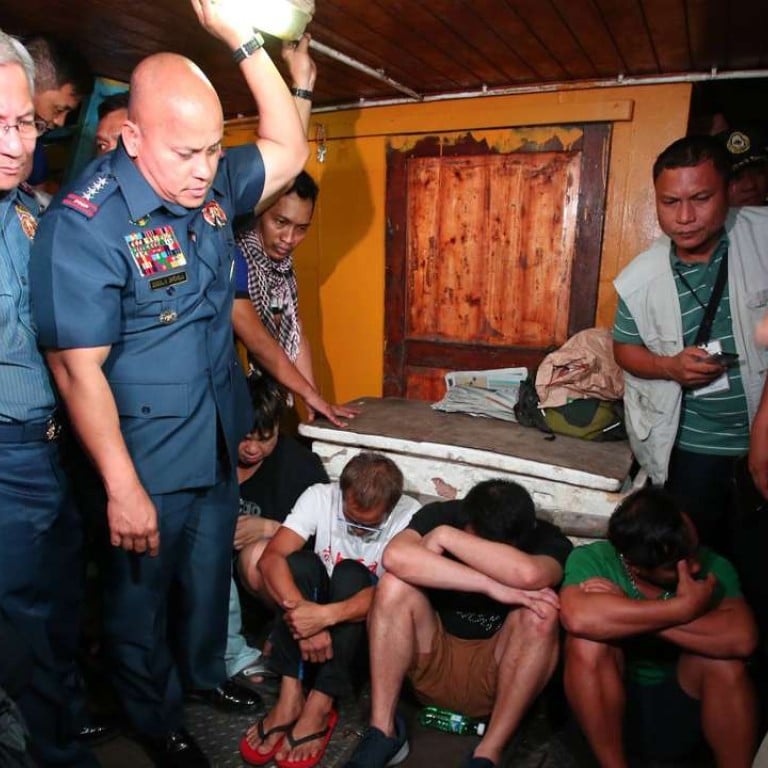
Breaking Bad at sea? Four Hongkongers to be charged in Philippines after being arrested on floating drug lab
Police raid fishing vessel in Zambales allegedly used to make and transport shabu, also known as methamphetamine hydrochloride
Four Hong Kong men are facing life in jail in the Philippines after a raid on a “floating crystal meth laboratory ” moored off the country’s popular tourist resort of Subic Bay.
The men – who appeared in court in Manila yesterday following their arrest on Monday – deny charges of manufacturing illegal substances and possessing half a kilo of the powerful stimulant drug methamphetamine, also known as “Ice’’ .
They were arrested on board a 50-metre fishing boat two miles off the coast of Zambales province, north-west of Manila, in a high-profile operation led by the country’s police chief Ronald de la Rosa.
The authorities alleged the men were part of a racket that was moving drugs from the vessel onto the mainland and that equipment used in the production of crystal meth – known as shabu in the Philippines – was also seized.
All four Hong Kong men, Leung Shu-fook, 49, Lo Wing Fai , 28, Kwok Kam-wah, 47, and Chan Kwok-tung, 42, have sought assistance from the Chinese Embassy in Manila.
A spokesman from the Hong Kong Immigration Department said it had so far received a request for assistance from the family members of one Hongkonger.
It had also contacted the Office of the Commissioner of the Ministry of Foreign Affairs of the People’s Republic of China in the HKSAR and the Embassy of the People’s Republic of China in the Philippines to get a better understanding of the situation.
A government source with knowledge of the illegal drug smuggling activities said crystal meth was one of the most popular illegal drugs in the Philippines where each gram could be sold for several times more than in Hong Kong.

It was understood there are a lot of small-scale drug labs that produce crystal meth in the secluded areas or suburbs of the country, but the quality is not high.
The high-profile arrests were given prominent treatment in the Philippines media and came at a time of high-tension over territorial claims in the South China Sea and a pledge by the country’s new president Rodrigo Duterte to wage a “relentless and sustained” war on drugs and crime.
Philippines television news showed De la Rosa joking with journalists and saying: “Let’s just tie them by their necks and drop them into the sea, you like?”
Last night Hong Kong lawmaker Paul Tse Wai-chun, a solicitor who has offered help to Hong Kong people detained in the Philippines said he was concerned about the current atmosphere over crime in the country.
“I worry that current Sino-Philippines relations – which are not at their best now – might have an adverse impact on the case,” Tse said.
Human rights watchdogs have criticised Philippines law enforcers for shooting suspects in operations. From June 30 to July 11, the Philippine Daily Inquirer has tallied 136 such “summary killings”, with many of them taking place during arrests.
I worry that current Sino-Philippine relations might have an adverse impact on the case
Edre Olalia, the director of the National Union of People’s Lawyers, told the Post the police may have received the wrong signals from the new president – a hardliner in combating drugs and crime.
“While the president has spoken loud and clear that he is uncompromising with respect to due process and rule of law, the message may have been lost in translation from the top to the policeman on the beat. Maybe they are getting wrong signal,” he said.
“For instance, arresting officers may be misinterpreting the phrase that they are entitled to shoot if the suspect resists arrest.
“Is refusal to go with police or to open the door of the house tantamount to resisting arrest? That has to be clarified,” said Olalia.
Last year a United Nations report identified Hong Kong and the mainland as key players in the burgeoning meth trade, citing law enforcement authorities in the Philippines and Australia.
It also cited corruption within China’s pharmaceutical industry as a key factor in Guangdong becoming the production centre.
Hong Kong-Phillipine relations hit a significant low point during a bus hostage crisis in 2010, in which eight Hongkongers died.
Additional reporting by Clifford Lo


